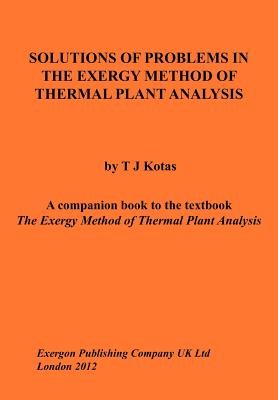
- We will send in 10–14 business days.
- Author: Tadeusz J Kotas
- Publisher: Paragon Publishing
- Year: 2012
- Pages: 166
- ISBN-10: 1782220003
- ISBN-13: 9781782220008
- Format: 17 x 24.4 x 0.9 cm, minkšti viršeliai
- Language: English
- SAVE -10% with code: EXTRA
Solutions of Problems in the Exergy Method of Thermal Plant Analysis (e-book) (used book) | bookbook.eu
Reviews
Description
A companion book to the textbook The Exergy Method of Thermal Plant Analysis. This Companion Book presents model solutions to the questions taken from Appendix G of the main textbook. Since the Exergy Method is a relatively new area of Applied Thermodynamics it was thought that the presentation of model solutions of problems of various types would be of some help both to teachers and to self-teaching students. The advantages of the use of exergy analysis were demonstrated by pointing out and quantifying thermodynamic losses of various plant components and plant configurations. These were discussed at the end of the solutions under Comments. It is hoped that this will give students a deeper understanding of the nature of irreversibilities of various kinds and their effect on plant performance. Dr Tadeusz J. Kotas joined the Department of Mechanical Engineering of Queen Mary College as a member of teaching staff in 1957. His main areas of interest were Mechanics of Fluids and Applied Thermodynamics, obtaining a PhD degree for his work in the former subject. His work in the latter subject focused on the Exergy Method, contributing to its development through his research and publications and to its dissemination through courses which he ran in Britain and in a number of European countries for practicing engineers and academics.
EXTRA 10 % discount with code: EXTRA
The promotion ends in 22d.21:34:51
The discount code is valid when purchasing from 10 €. Discounts do not stack.
- Author: Tadeusz J Kotas
- Publisher: Paragon Publishing
- Year: 2012
- Pages: 166
- ISBN-10: 1782220003
- ISBN-13: 9781782220008
- Format: 17 x 24.4 x 0.9 cm, minkšti viršeliai
- Language: English English
A companion book to the textbook The Exergy Method of Thermal Plant Analysis. This Companion Book presents model solutions to the questions taken from Appendix G of the main textbook. Since the Exergy Method is a relatively new area of Applied Thermodynamics it was thought that the presentation of model solutions of problems of various types would be of some help both to teachers and to self-teaching students. The advantages of the use of exergy analysis were demonstrated by pointing out and quantifying thermodynamic losses of various plant components and plant configurations. These were discussed at the end of the solutions under Comments. It is hoped that this will give students a deeper understanding of the nature of irreversibilities of various kinds and their effect on plant performance. Dr Tadeusz J. Kotas joined the Department of Mechanical Engineering of Queen Mary College as a member of teaching staff in 1957. His main areas of interest were Mechanics of Fluids and Applied Thermodynamics, obtaining a PhD degree for his work in the former subject. His work in the latter subject focused on the Exergy Method, contributing to its development through his research and publications and to its dissemination through courses which he ran in Britain and in a number of European countries for practicing engineers and academics.


Reviews